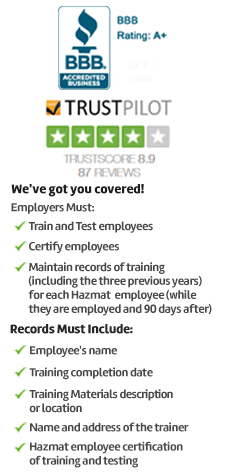
IATA Lithium Battery Air Transport

Lithium batteries are hazardous and can cause fire when air shipped as cargo. IATA has imposed regulations on transporters and handlers sending Lithium batteries through air carriers.
This course focuses on educating learners about the regulations and safety methods associated with transporting lithium batteries on air, products classifications under the regulations, stipulated packing and labeling procedures and how to reduce risks while transporting such goods via air.
Lithium batteries are widely used as power sources for cell phones, mobility devices, electronic gadgets and laptops. These batteries can pose danger in adverse conditions or if mishandled. So, it is imperative to know the dangers, risks and hazards involved in shipping these batteries, regulations and safe practices in handling and transporting hazardous cargo aboard an aircraft.
Governing regulations
This course helps learners to get familiar with International Air Transport Association IATA Dangerous Goods Regulations and safety standards to minimize the risks. IATA has made it mandatory to follow regulations since January 1, 2013 to ship lithium batteries via air because these batteries can prove fatal as it can provide high currents and discharge rapidly when short-circuited.
Who Must Take this Course?
Employers of goods handlers and carriers services should ensure that their workers are adequately trained to ensure safe movement of dangerous cargo through air. Employees need to undergo preventative training to avoid accidents and damages. Safe cargo handling training should be extended to airport goods handling workers such as loaders, warehouse managers, passenger-handling staff, freight acceptance staff and cabin crew. Staff members, who are responsible for airport and passenger security and are expected to respond in case of fire, smoke or fumes, should take up this course.
Course Format
Our IATA Lithium Battery Air Transport Guidance course has high quality content, informative graphics, audio presentations, self check questions for better preparation, and a final exam.
Upon successful conclusion of the course, each candidate will get a hard copy of completion certificate and a printable wallet card file.
Continuing education credits?
Each learner will receive 0.2 CEUs (or 2 CMEs) for completing this e-learning course.
Topics Covered
- Introduction to Transporting Lithium Batteries
- Applicability
- Key Terms
- Lithium Battery – History
- Background
- Overview
- Statistics for Transporting Lithium Batteries by Air
- Responsibilities
- Governing Authorities
- Applicable Regulations for Transporting Lithium Batteries – IATA
- Applicable Regulations for Transporting Lithium Batteries – Carry-on Luggage
- Applicable Regulations for Transporting Lithium Batteries – Shipping
- Applicable Regulations for Transporting Lithium Batteries – Labeling
- Cargo Acceptance and Handling for Lithium Batteries
- Acceptance
- Loading
- Operator Approval and General Cargo Handling
- Types of Hazards for Transporting Lithium Batteries
- Procedures for Fire Event
- Lithium Battery Event – Fire-fighting Procedures
- Controls
- Controls – Risk Assessment
- Controls – Risk Likelihood
- Controls – Risk Acceptability
- Controls – Incident Occurrence
- Engineering Controls
- Personal Protective Equipment
- Training Requirements
- Guidelines
- Additional Resources
- Summary
- Exam

 NEBOSH CERTIFICATE
NEBOSH CERTIFICATE NEBOSH DIPLOMA
NEBOSH DIPLOMA IOSH
IOSH SAFETY DIPLOMA
SAFETY DIPLOMA CPD UK
CPD UK ROSPA UK
ROSPA UK FOOD SAFETY
FOOD SAFETY 



